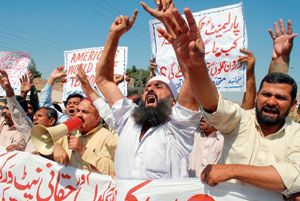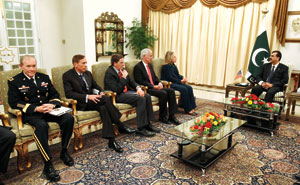CQ WEEKLY – IN FOCUS
Oct. 22, 2011 – 12:15 p.m.
Necessary Alliance With Pakistan Doesn't Sit Well
By Emily Cadei, CQ Staff
Every few months, it seems, relations between the United States and Pakistan reach a new low. The discovery that Osama bin Laden had been hiding in Pakistan for years came soon after the diplomatic skirmish over CIA contractor Raymond Davis, who shot and killed two Pakistanis in Lahore. Then, last month, there was the Taliban attack on the U.S. embassy in Kabul, allegedly orchestrated from Pakistan.

|
||
|
The latest trough came late last month with retiring Joint Chiefs of Staff Chairman Adm.
The reaction of Pakistan’s military leaders was much more muted, however. And foreign policy specialists say that even as the public debate over the value of a continued partnership has grown increasingly shrill in both capitals over the course of the past year, American and Pakistani leaders have continued regular dialogue and cooperation through backroom channels.
Mullen’s remarks, however, may limit what those leaders are able to accomplish. For one thing, his highly publicized acknowledgment of Pakistani support for the Haqqani network — a Taliban-allied group of Pakistan-based militants that has become one of NATO’s main foes in Afghanistan — strengthens the hands of hard-liners in Congress who want to cut off all aid to Islamabad. People following the issue now widely anticipate a substantial, if not total, reduction in U.S. military assistance in fiscal 2012. Going forward, Mullen’s comments will also constrain the Obama administration’s efforts both to maintain a relationship with Pakistan’s military and to reach a broad peace settlement with militants in Afghanistan, including the Haqqanis.
What hasn’t changed, regional experts say, is the central role Pakistan will play in any final peace that is made in Afghanistan. In that respect, the United States and Pakistan will find themselves bound together regardless of how the relationship evolves in the coming months.
A Growing Bet

|
||
|
Since the Sept. 11 attacks, the United States has spent more than $20 billion on aid to Islamabad, most of it for security-related assistance funneled through the State Department and the Pentagon. Congress tried to shift that balance in 2009, authorizing $7.5 billion in economic and development aid over five years.
These days, however, Congress seems more inclined to hold back a significant portion of the $5 billion in U.S. aid to Pakistan requested by the Obama administration for fiscal 2012. The pressure has been growing all year but intensified after bin Laden was killed in May. Mullen’s statement on the Haqqani network to the Senate Armed Services Committee on Sept. 22 may have been the turning point.
“I think Adm. Mullen spoke the truth,”
“I think what you heard was sort of a farewell admission that what he tried cannot work,” says Lieberman, an independent from Connecticut.
Texas Republican Rep.
Necessary Alliance With Pakistan Doesn't Sit Well
The White House carefully tried to walk back from Mullen’s statement, with spokesman Jay Carney telling reporters, “Well, it’s not language I would use.” But lawmakers have not been mollified.
Even before Mullen’s remarks on the Haqqanis, lawmakers were taking steps to restrict money flowing to Pakistan. Granger, as chairwoman of the House Appropriations subcommittee that funds the State Department and foreign aid, released a draft bill in July that would significantly tighten the conditions under which approximately $3 billion in economic and security aid overseen by the State Department would be released.
Her panel’s State-Foreign Operations appropriations draft would require the secretary of State to certify, among other things, that the Pakistani government “is preventing al Qaeda, the Taliban and associated terrorist groups, such as the Haqqani Network, Lashkar-e-Taiba and Jaish-e-Mohammed, from operating in the territory of Pakistan,” before releasing any of the approximately $3 billion in civilian aid the president requested for fiscal 2012.
The Senate’s appropriations bill, marked up by the committee last month, would tie State Department aid to Pakistan’s counterterrorism efforts, but its language is less stringent — requiring “cooperation” with the United States in its efforts against terrorist organizations — and would give the secretary of State the power to waive the provision on national security grounds.
Congressional leaders will have to work out what language to include in its final appropriations legislation for 2012. But regardless, many lawmakers say the fact that someone as well-regarded and senior as Mullen alleged significant cooperation between Pakistani officials and the Haqqani network will make it very difficult for the administration to meet the House panel’s certification requirement.
It is, Sen.
‘Bald-Faced Lie’

|
||
|
The Haqqani network has been widely blamed for a series of attacks in Afghanistan, including on U.S. soldiers.
“We’ve always seen in the past that the administration will certify the moon is made of green cheese,” says Kirk, one of Pakistan’s most vocal critics. However, the Illinois Republican says at this point it’s well-known that the leaders of the Haqqani network “could be sipping iced tea on their balcony in full Predator view and know that there is no chance that they would ever be hurt. And that is because of a decision made by” Pakistani spy chief Lt. Gen. Ahmed Shuja Pasha “and his team to just bald-faced lie to American officials.”
Given those sentiments, it is widely expected that the funding the United States provides to Pakistan’s military — more than $1.1 billion for a counterinsurgency fund requested by the State Department and $2.2 billion in coalition funds overseen by the Defense Department — will be pared back significantly. Already this year, the White House suspended $800 million in security assistance distributed by the Pentagon.
“The most likely outcome from the Mullen statement is that the United States Congress will hold firm on legislation that would condition aid,” Daniel Markey, a senior fellow at the Council on Foreign Relations, predicted this month in a conference call with reporters. “As a consequence, you would see U.S. military assistance to Pakistan dry up.”
That, Markey said, “would accelerate a broader rupture between our two countries.”
Necessary Alliance With Pakistan Doesn't Sit Well
Other academics say the drop in military assistance is part of a necessary shift in policy, regardless of the backlash in Pakistan. And it would not, at this point, come as a surprise to Islamabad.
Maintaining U.S. economic and development aid to Pakistan, moreover, could help mitigate some of the fallout from any decline in military assistance, Pakistan specialists say. And they argue that it would send an important signal about the United States’ long-term intentions.
Many lawmakers appear to share that view. “Our anger is not with the Pakistani people, it’s with the military and intelligence,” Lieberman says. Kirk also says he is concerned specifically about military assistance.
Granger says the decision to tie the funds aimed at helping Pakistan’s civil society and economy to Pakistani military cooperation in her bill simply reflects the will of Americans.
“You have to take into account the feeling of members of Congress,” she says, as well as “people at home who are concerned that we are funding” Pakistan’s government at all.
She also says the language was worked out in concert with House Select Intelligence Chairman
The House Republicans’ approach worries some experts. “There’s a lot of debate about whether” the U.S.-Pakistan relationship is “a strategic relationship or a transactional relationship,” Stephen J. Hadley, former national security adviser to President George W. Bush, said last week at a U.S. Institute of Peace round table with reporters. Hadley, now with the congressionally funded institute, and several of his colleagues recently completed a trip to Pakistan, and “we came away saying it’s both.”
“In terms of our investment economically and in terms of development assistance, that’s the strategic part. It should be relatively unconditioned other than the kind of transparency that is required in order to make the aid effective,” said Hadley. “But in terms of security cooperation, counterterrorism, that probably is pretty transactional.”
Anger in Islamabad
Mullen’s assessment of Pakistan’s complicity with the Haqqani network also roiled the relationship from the Pakistani side, prompting swift condemnation from Pakistan’s streets and its politicians. The “Pakistani media almost seemed like they were going to war on their own,” joked Moeed Yusuf, the South Asia adviser for the U.S. Institute of Peace, who was in the country at the time.
But Yusuf also underscored that “both here and in Pakistan behind the scenes there was a very conscious effort to make sure that didn’t impact what they are doing together.”
“The impression that I walked away with,” Yusuf said at the institute’s round table, “is that there is a fair bit of realization where it really matters, behind the scenes, that divorce is simply not an option.” His point was reinforced last week by a high-level U.S. visit by a delegation including Secretary of State
The poisonous public sentiment surrounding the relationship has often forced policy makers’ hands. In Pakistan, that has meant rescinding visas for U.S. military trainers, for example, or blocking supply routes to Afghanistan, which U.S. military forces rely on. In the United States, the main source of leverage has been threats to cut aid funds. Last week, Senate Armed Services Chairman
Necessary Alliance With Pakistan Doesn't Sit Well
Another policy that is gaining political currency on Capitol Hill, but would complicate relations behind the scenes, is designating the Haqqani network as a foreign terrorist organization. Levin, in the hearing with Mullen last month, said that move would give the United States more tools to sanction those militants. “The step is long overdue,” the Michigan Democrat said. Lieberman echoes that sentiment, saying that classifying the Haqqani network as a terrorist organization is “the first thing we should do.”
But that move could hamper U.S. efforts to forge a negotiated peace settlement in Afghanistan. Clinton confirmed last week that U.S. officials have reached out to Haqqani operatives to test their interest in peace talks, but any talks with a designated terrorist group would be against the law.
While it’s true Haqqani leaders may never agree to a political settlement, as some who favor the terrorist listing point out, many experts say some sort of broad peace agreement, ideally including the Haqqanis, is the best hope Americans have to leave behind a relatively stable Afghanistan in the next few years.
“It’s ultimately completely plausible that there’s no way to deal with this politically,” says a Senate aide. “But we have to find out. We can’t fight another 10 years’ war over there.”
And any viable settlement in Afghanistan, they say, requires Pakistan’s active participation. “I’m of the view that a regional solution is really the only way to go,” says S. Amer Latif, a visiting fellow at the Center for Strategic and International Studies. And “if you don’t include Pakistan in a regional solution, it’s going to be dead on arrival.”
Hadley said he saw glimmers of hope during his recent visit to the region. “We had the sense there was an increasing consensus among Afghans, Pakistanis and Americans about what the endgame is,” he said.
That, he said, “is a stable, peaceful Afghanistan,” something Pakistan has not always worked toward. “The one thing that we heard over and over was a fear and no desire to go back to the civil war and warlordism of the past,” Hadley added.
Agreeing on goals is one thing, however, and developing a strategy to achieve those goals is entirely another.
Latif expresses hope that bringing in other countries would ease tensions in the Pakistan- Afghanistan relationship, and perhaps help U.S.-Pakistan relations, both of which are quite tenuous at the moment.
But ultimately, successful negotiations will hinge on the governments in Washington, Islamabad and Kabul figuring out a way to stop the downward spiral of public attacks that undermine the trust and political viability of their partnerships.
“At some point each of these governments is going to have to stand up to their people and begin defending the relationship,” Hadley said of the United States and Pakistan. “You can’t just keep drawing out of the account of that relationship for political purposes or the account’s going to be empty.”
FOR FURTHER READING:
The Senate State-Foreign Operations appropriations bill is